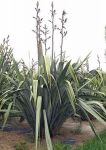Kōhunga
| Cultivar No | 16 | |
|---|---|---|
| Source | Maniapoto area. | |
| Description | Tall, rather droopy blue-green blades. Glaucous blue-green on underside. Black margin and keel. Many very tall flower heads with small seed pods. |
|
| Uses | Long recognised as a fine cultivar. One of the favourites of the Maniapoto people. Strips well into long, silky white fibres. Mrs Rangimarie Hetet and her daughter Diggeress Te Kanawa use this harakeke for the whenu in their finest kākahu. For kete, when boiled for one minute, the leaf dries to a very pale creamy fawn. Darker when unboiled. Rene writes: "A time of great pride for all was when Aromea Te Maipi, a tutor in Māori weaving, came to my plantation and together we collected a bundle of the superior whītau blades from Kōhunga and Taeore. Members of the Māori Women's Welfare League helped her to prepare the whītau and feathers which Aromea used to weave a beautiful little muka and feather kete. This was presented to Her Royal Highness Diana, Princess of Wales, when she and His Royal Highness Charles, The Prince of Wales, visited Te Poho-o-Rawiri Marae in Gisborne in April 1983." |
|
| Muka extraction | Only older leaves release muka cleanly. Muka in younger leaves breaks halfway towards tip of leaf. | |
| Raranga - unboiled | Excellent raranga flax. Feels strong and is easy to soften. Stronger than Taeore. Contains more fibre. |




